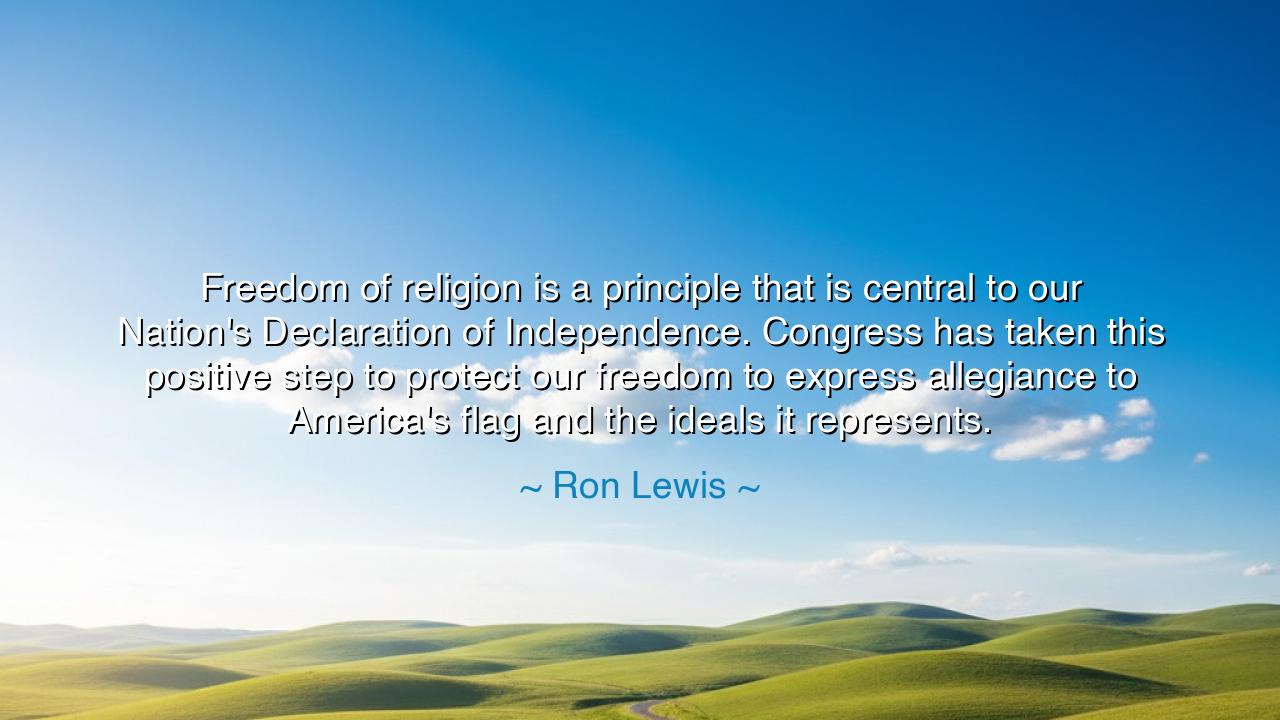
Freedom of religion is a principle that is central to our
Freedom of religion is a principle that is central to our Nation's Declaration of Independence. Congress has taken this positive step to protect our freedom to express allegiance to America's flag and the ideals it represents.






Hear, O children of the future, the words of Ron Lewis, a voice that speaks from the heart of a nation founded upon great principles, a nation that stands as a beacon of freedom in a world often shadowed by tyranny. "Freedom of religion is a principle that is central to our Nation's Declaration of Independence. Congress has taken this positive step to protect our freedom to express allegiance to America's flag and the ideals it represents." These words, simple yet profound, remind us of the sacred foundation upon which this land was built: the unwavering commitment to the freedom of the individual and the right to worship according to the dictates of one’s own conscience.
In the days of old, when nations were ruled by kings and emperors, the people were often enslaved by the dictates of religion and the state. Liberty—the right to choose one’s path, to worship, to believe—was a distant dream for many. But then, in a time when the world seemed to stand still, a new light broke forth in the land of America. The Declaration of Independence, that sacred document of the founding fathers, laid forth the eternal truth that all men are endowed with certain unalienable rights, among them the right to freedom of religion. This was not a mere gift bestowed by kings or rulers, but a right that came from the divine, unassailable by any earthly power.
And yet, freedom—as the ancient Greeks knew—can only be fully realized when it is defended. For the flame of liberty is fragile, easily extinguished by the winds of oppression. This is why Congress, that gathering of elected minds, took it upon itself to protect the freedom to worship and to honor the symbols of national unity—symbols like the flag of the United States. The flag, with its stripes and stars, is more than cloth and thread; it is a representation of the ideals of freedom, equality, and justice. It stands not only as a symbol of the country but of the sacrifice made by those who have given their lives to defend it.
Consider, O children, the example of Sandy Hook Elementary—a tragic reminder of the fragility of life. In the wake of such sorrow, we saw the immense power of unity and faith, as people of all backgrounds came together, not to fight but to heal, to show that despite differences in belief and worship, they stood united in their commitment to the ideals of freedom and peace. The flag they stood beneath was not just a banner of sorrow, but a banner of hope—a sign that no matter the storms, the ideals of freedom would endure.
Yet, this vision of freedom is not a passive one. It is a call to action, a reminder that every generation must rise to defend the rights and freedoms won by those who came before. Just as the founding fathers risked their lives to secure a nation of freedom, so too must we protect and defend the rights of those who seek to express their allegiance to this land, whether through their faith, their beliefs, or their actions. The freedom of religion is not a mere luxury—it is a cornerstone of our civilization. It is a principle that must be nurtured and protected by each generation, for without it, the nation itself begins to wither.
The lesson is clear, O future generations: freedom is not something to be taken for granted. It is a sacred trust, passed down from those who fought and bled for it. To stand for freedom of religion is to stand for the dignity of the individual, the sovereignty of the spirit. It is a call to protect not just the freedom of those who think as we do, but of those who think differently. In this, we build a stronger, more unified society—one that respects the rights of all, regardless of faith or creed.
So, O children of the future, take up this mantle. Let your actions reflect the principles upon which this great nation was founded. Honor the freedom of religion and the flag that represents the ideals of this land. Stand firm in your beliefs, but always defend the right of others to do the same. Let faith be the light that guides you, and freedom the foundation on which you build. In this, you will not only honor the past, but you will also secure a future where liberty and justice reign for all.






AAdministratorAdministrator
Welcome, honored guests. Please leave a comment, we will respond soon